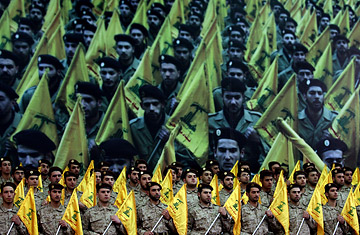
Hezbollah militants stand at attention as hundreds of people gather in a huge hall waiting to watch a televised speech by Hassan Nasrallah.
The inconclusive results for Israel of the monthlong war it fought in the summer of 2006 against Lebanon's militant Shi'ite Hizballah meant that another confrontation was probably just a matter of time. And with the February 12 assassination in Damascus of a senior Hizballah commander continuing to roil the waters of the Middle East, that much-anticipated second round could be drawing nearer.
Hizballah has vowed revenge for the car bomb killing of Imad Mughniyah, and Israel is taking the threat seriously. Israel has placed its army on alert and reinforced its presence along the northern border with Lebanon. Patriot anti-missile batteries have been deployed near Haifa, Israel's second-largest city, 40 kilometers south of the Lebanese border. Even airlines flying into Israel have been instructed to ensure that all passengers are seated half an hour before landing to protect against a 9/11-style hijacking and aerial attack.
Hizballah also is on alert. In south Lebanon, young men normally living and working in Beirut during the weekdays were back in their home villages last week, visible indication that Hizballah has placed its cadres on standby. "We are ready for another war and it will come," says a local Hizballah unit commander who fought in the 2006 war. On the walls of his sitting room, "martyr" portraits of his fallen comrades are plastered alongside pictures of Hizballah chief Sheikh Hassan Nasrallah and Iran's supreme leader, Ayatollah Ali Khameini. In another room, a walkie-talkie constantly squawked as Hizballah fighters kept in contact with one another.
Spooning brown sugar into tiny glasses of tea, the Hizballah commander said that the Shi'ite fighters will be on the offensive in the next war, hinting at taking the battle into Israel itself. "We weren't expecting the last war and we fought only to defend our land, but next time you will see a very different kind of fighting," he said.
The 13,300-strong United Nations peacekeeping force in south Lebanon, known as UNIFIL, has been watching developments warily. One senior UNIFIL officer said that neither side probably wants to go to war at the moment and that Hizballah's alert in the south was "defensive." But the officer said the "situation in the region is so dangerous that the tiniest spark can start a new war."
The death of Mughniyah may have marked a turning point in the long conflict between Hizballah and Israel. After years of ambivalence over Mughniyah's connection with the Shi'ite party, Hizballah leaders have embraced him as one of its greatest resistance leaders, responsible for turning the group's military wing into the heavily armed crack fighting force it is today. In the West, Mughniyah was better known for his alleged association with the large-scale suicide bomb attacks and kidnappings of foreigners in 1980s Beirut. More recently, Mughniyah reportedly assisted militant groups in the Palestinian territories and in Iraq, ensuring that the impact of his death reverberates far beyond Lebanon's borders. Last week, the Kuwaiti embassy in Beirut was evacuated following an anonymous telephone threat to rocket the building. The threat came amid an uproar in Kuwait when Shi'ite lawmakers held a rally to mourn Mughniyah's death, drawing anger and a lawsuit from Sunni legislators. The Kuwaiti authorities blame Mughniyah for a series of attacks in the Gulf state in the 1980s. Kuwait has now joined Saudi Arabia in issuing Lebanon travel advisories for its citizens.
